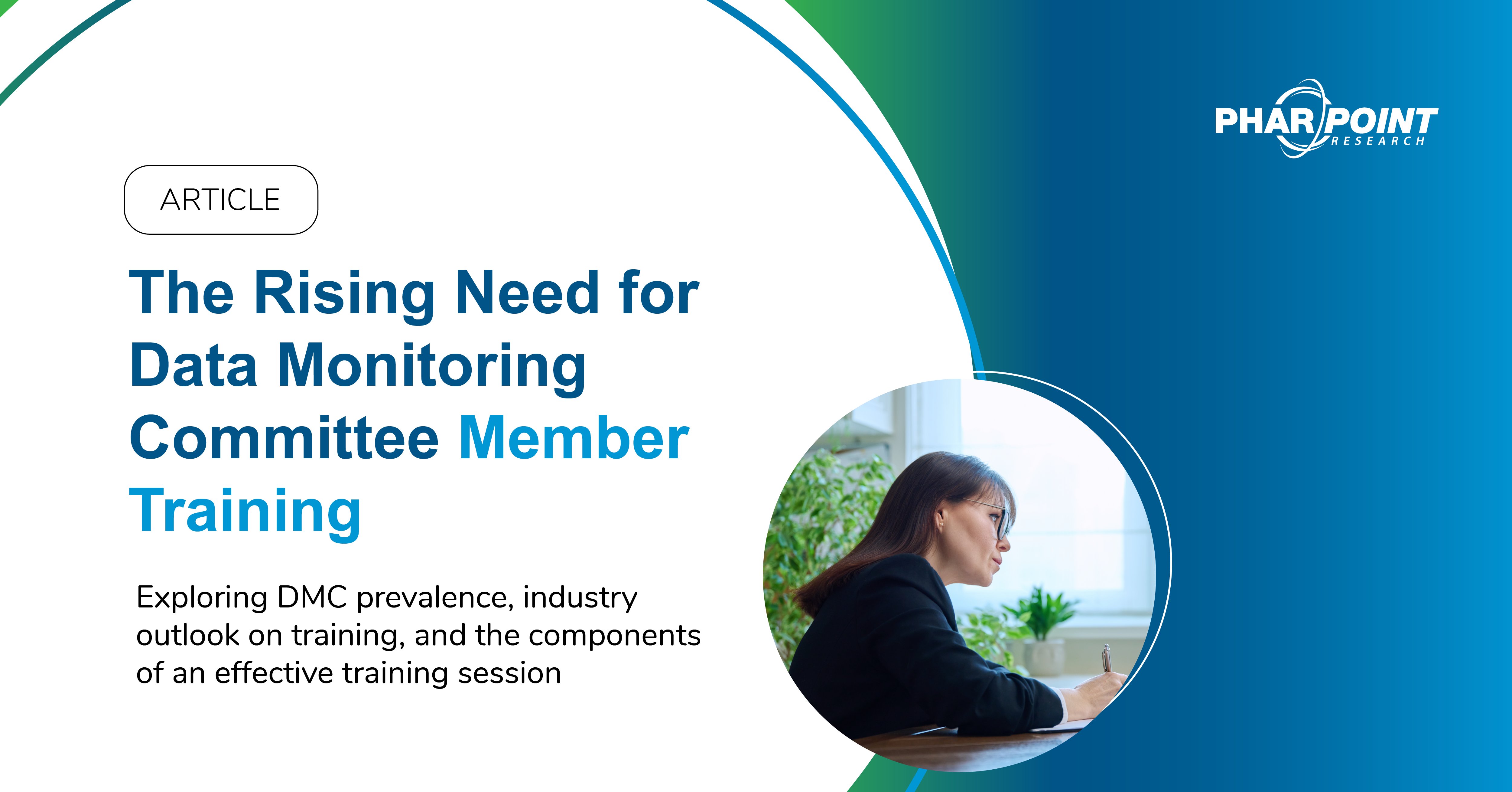The Growth of DMCs Compared to the Growth of Qualified DMC Members
DMCs are being used more frequently in clinical trials, with the FDA’s latest draft guidance on DMCs stating that there has been “an increase in the use of DMCs in many disease areas beyond those involving serious morbidity or mortality.”1
In fact, a 2015 report that reviewed 4,200 manuscripts from the publication year 2010 compared a similar search of the publication year 2000. The report found that the “mention of DMCs in industry-sponsored randomized control trials from high-impact journals increased from 24% to 47%.”2
However, even with an increase in DMC usage, the availability of qualified committee members has trailed behind.3 Committee members — typically a group comprised primarily of clinicians along with at least one statisticians — must collectively be multidisciplinary, well-informed, and familiar with DMC processes.
In addition to deep, relevant therapeutic expertise, clinicians serving committees must be familiar with statistical reports. DMC reports inform on the current progress of a trial and include incomplete and rarely fully cleaned data. Clinicians must be able to look at these reports and accurately interpret them in a way that facilitates efficient review.
Similarly, the statisticians preparing DMC reports must have the right experience, allowing them to prepare digestible reports that address the range of questions of interest to the DMC. Their experience must include an understanding of the disease, the intervention’s mechanism of action, and the study protocol.
Industry Outlook on DMC Member Training
In February 2024, FDA’s draft guidance on DMCs (the first revision since 2006) included a new section on DMC Member Training. The guidance stated that “adequate preparation for the role as a DMC member is integral to the DMC’s mission.”1
It also “strongly encouraged” that Sponsors “consider the learning and training requisites of members selected to serve on a DMC before involvement.”1
The Clinical Trial Transformation Initiative (CTTI), a group co-founded by Duke University and the U.S. Food Administration in an effort to improve the quality and efficiency of clinical trials, conducted a survey on the topic of DMCs, including committee member training, in 2016.4
The survey included 143 people, with:
- 76 DMC members
- 52 sponsors involved with the organization of DMCs, and
- 15 statistical data analysis center representatives.
Survey findings stated that “participants indicated that there are no standards or guidelines pertaining to qualifications of DMC members. Furthermore, only 8% of DMC member survey respondents received any formal training. 94% were not aware of any training programs.”
The CTTI concluded in their findings that “overall, it was clear that increased training will be needed to prepare the next generation of qualified DMC members to meet the growing demand.”4
Furthermore, in the CTTI’s recommendations on DMCs, uploaded in 2021, the group states that “sole reliance on on-the-job training is not feasible due to the complexity of the role and size of the currently available pool of candidates.”5
“We are seeing a lack of DMC-experienced clinicians,” PharPoint Research Sr. Project Specialist Victoria Elder shared.
Victoria works at PharPoint, a contract research organization (CRO), as an independent DMC coordinator. She holds a Master’s in Clinical Research, with a thesis focused on DMC training.
“Training is an important part of DMC composition and conduct,” Victoria said, “whether it is helping clinicians understand how to interpret the outputs that they will receive, or understanding the study trial design or endpoints. Committee members without a strong background in DMCs typically are not as familiar with these concepts, and we want to ensure they are comfortable with all of the roles and responsibilities of being a DMC member.”
To help fill in this gap in knowledge, Victoria and her PharPoint colleagues within biostatistics are developing brief didactic training sessions for clinicians serving on DMCs.
The Components of An Effective Committee Training Session
An effective training session must be informative and concise, with insight that can help newer committee members overcome the primary challenges they are likely to encounter.
Victoria shares some common obstacles committee members with less DMC experience may encounter, including:
- Discussing methods to relieve tension when it comes to finding a consensus,
- Clarifying roles and responsibilities,
- Understanding the methodologies of the interim analyses, and
- Reviewing key aspects of output.
“Output commonly created as part of clinical trials can be a little bit confusing when one encounters it for the first time,” Victoria shared. “Our training reviews key aspects on the tables, figures, and listings and notes items to expect and consider as part of the DMC review process.”
Conclusion
In conclusion, there is a rising need for specialized training among DMC members as the frequency of DMC usage in clinical trials increases.
With the complexity of committee participation and the critical role that DMCs play in advising sponsors on the continuity of a trial, it is clear training programs that are both comprehensive and concise can be of value.
With the right support in place, DMC members can comfortably leverage their skills to interpret complex data accurately, ultimately contributing to more effective committees and a strong pool of candidates for the “next generation” of DMC members.
About
PharPoint Research is a US-based, client-focused CRO that helps sponsors meet their study goals.
As part of PharPoint’s DMC services, we act as an independent partner to sponsors that can support committee members and manage logistical challenges.
For more information about how PharPoint can support your DMC, including the provision of DMC member training, visit our DMC Services page or schedule a call with our team.
References
- Use of data monitoring committees in clinical trials: Guidance for industry [Internet]. U.S. Food and Drug Administration; [cited 2024 Jun 14]. Available from: https://www.fda.gov/media/176107/download
- Seltzer J. An estimate of the benefit-cost impact of the FDA guidance on Data Monitoring Committees. Therapeutic Innovation & Regulatory Science. 2015 Mar 9;49(5):698–705. doi:10.1177/2168479015573586
- Fleming TR, Wittes J, Fiuzat M, Bristow MR, Rockhold FW, Connor JT, et al. Training the next generation of Data Monitoring Committee members. JACC: Heart Failure. 2024 Mar; doi:10.1016/j.jchf.2024.02.016
- Calis KA, Archdeacon P, Bain RP, Forrest A, Perlmutter J, DeMets DL. Understanding the functions and operations of Data Monitoring Committees: Survey and Focus Group findings. Clinical Trials. 2016 Nov 24;14(1):59–66. doi:10.1177/1740774516679665
- CTTI recommendations: Data Monitoring … [Internet]. 2021 [cited 2024 Jun 14]. Available from: https://ctti-clinicaltrials.org/wp-content/uploads/2021/06/CTTI_DMC_Recs.pdf




